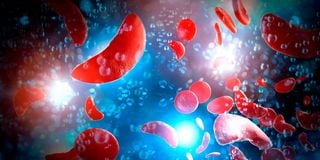Premium
More pain for sickle cell patients as Kisumu hospitals run out of drugs

A sickle cell patient suffers five episodes of crises annually and five to 10 days of hospitalisation per episode.
Caregivers of patients suffering from sickle cell anaemia in Kisumu County have raised concern over the shortage of crucial drugs used in the management of the disease in the public hospitals.
The drugs, Hydroxyurea and Paludrin, have not been available in the region since February and the scarcity has caused untold pain to patients.
“The drugs help with the free flow of the cells in the blood vessels. Without these drugs, the cells clog within the blood cells, therefore, causing extreme pains in the joints and other parts of the body," Ms Michele Omullo, who has been living with the condition for 27 years, said.
In extreme cases, she said, patients suffer from acute chest syndrome. They have to be given supplemental oxygen and "can be hospitalised for weeks."
Ms Veronica Bitta, a mother of three, is a worried woman. Her last-born son has the disease.
"Public hospitals don't have these crucial drugs," she said, adding: "The last time we had consistent supply of the drugs was late last year. By February this year, they had ran out."
The drugs are only in private chemists, where a capsule goes for between Sh55 and Sh59. Adults take two capsules daily while children take only one.
Birthmark founder and CEO Adhiambo Opondo called upon the government to provide more support for sickle cell patients, including free or subsidised medication and improved healthcare services. In Kisumu County, 21 per cent of all children are born with sickle cell anaemia strain. Many of such children die un-diagnosed with 50 to 90 per cent dying before their fifth birthday.
About 80 per cent of patients are below 15 years of age.
Analysis of data available at Jaramogi Oginga Odinga Teaching and Referral Hospital reveals that, on average, a sickle cell patient suffers five episodes of crises annually and five to 10 days of hospitalisation per episode.






